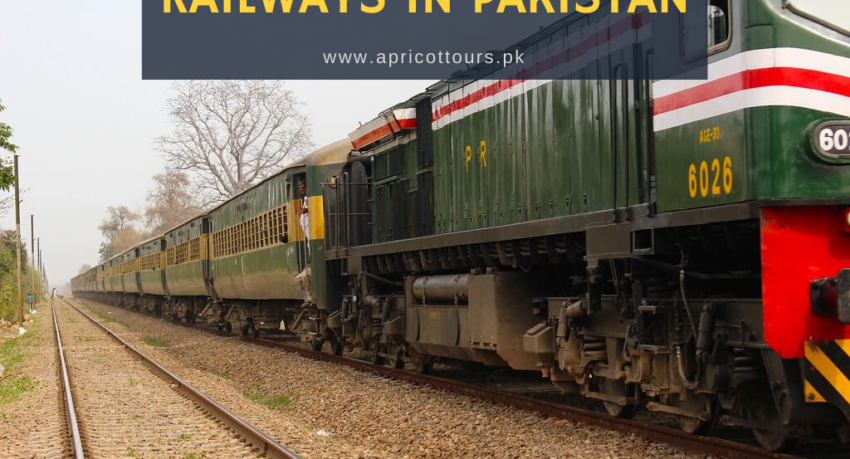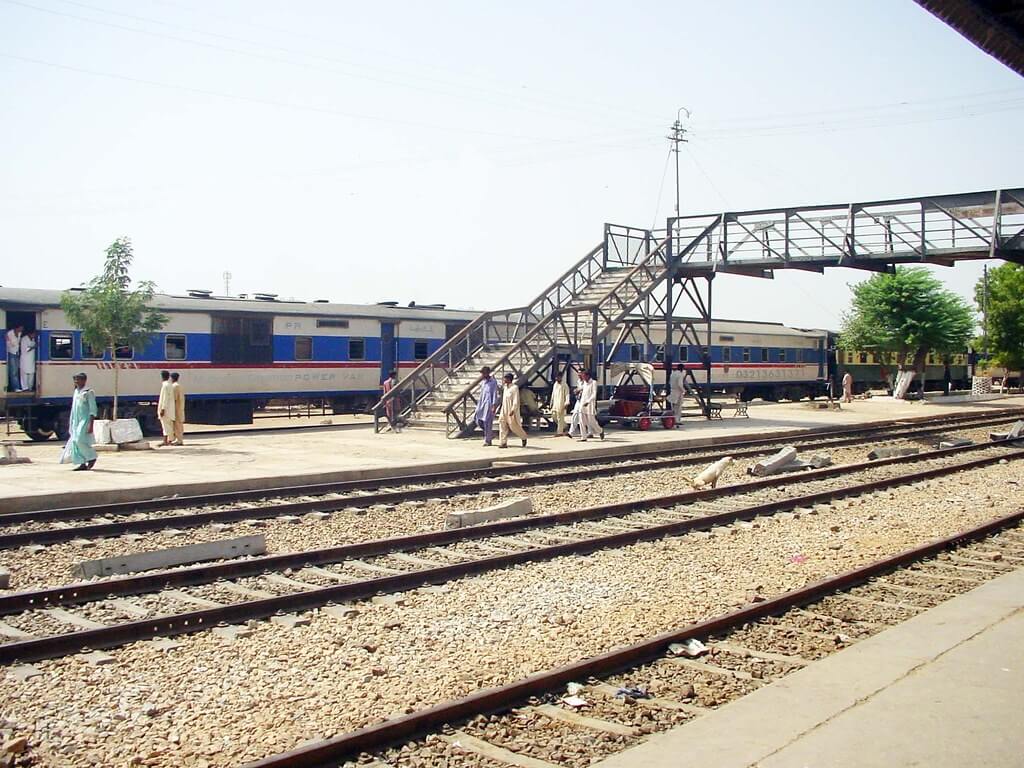Pakistan Railways History
Railways in Pakistan: It all began in 1855, during the British Raj when many railway firms began establishing local train routes in various areas of Sindh and Punjab. So, the country’s rail system began as a patchwork of local rail lines built and operated by small-scale commercial railway firms of the period, such as the Scinde Railway, Punjab Railway, Delhi Railway, and Indus Flotilla. However, the majority of these businesses united to become the North Western State Railway in 1880.
However, until 1947, the year of independence, the North-Western State Railway network spread into Sindh and Punjab. Following independence, Pakistani territories encompassed approximately 8,122 kilometers (5,047 miles) of North-Western State Railway train tracks.
Initially, Pakistan’s railway network was entirely based on narrow-gauge train tracks. Converting these narrow-gauge railway tracks to broad-gauge railway tracks has occurred on occasion throughout Pakistan’s railway history. From the 1950s until the 1980s, the country’s railway system underwent numerous large-scale enlargement projects. All narrow-gauge railway tracks in Pakistan have now been destroyed or converted to broad-gauge railway tracks, allowing for a more efficient flow of railway traffic. The history of Pakistan’s railways has been preserved and displayed in railway museums throughout the country.
Pakistan Railways Infrastructure
Pakistan’s railway network has 11,881 kilometers (7,383 miles) of train tracks. However, approximately 80% of the tracks are part of historical buildings dating back 80 to 90 years. According to current statistics, the highest speed on most of Pakistan’s railway lines is 120 km/h (75 mph). However, refurbished parts of the railway line between Karachi and Peshawar allow speeds of up to 130 km/h (81 mph). Furthermore, under the banner of CPEC Projects in Pakistan, work is underway to rebuild the majority of the major lines, allowing for greater train speeds of up to 160 kilometers per hour (99 mph) and reducing railway traffic congestion in Pakistan. The table gives you details about the main railway lines in Pakistan.
Main Railway Line in Pakistan
| Main Line 1 (ML-1) | Karachi-Peshawar Line | 1,687 kilometres |
| Main Line 2 (ML-2) | Kotri–Attock Line | 1,519 kilometres |
| Main Line 3 (ML-3) | Rohri–Chaman Line | 523 kilometres |
| Main Line 4 (ML-4) | Quetta–Taftan Line | 523 kilometres |
| Main Line 5 (ML-5) | Taxila–Khunjerab Line | 682 kilometres |
The mainline linking Peshawar and Karachi is being improved as part of Pakistan’s CPEC projects. It is a six-year project with a total cost of approximately $6.3 billion. For further details, see our blog on the expansion of Pakistan’s ML-1 train track. Pakistan’s Ministry of Railways has proposed new rail lines to connect Gwadar Port to Central Asia for passenger and freight transit. The names of these railway lines are listed as follows:
- Karachi–Gwadar Railway Line (Makran Railway)
- Gwadar–Mastung Branch Line
- Bostan–Zhob–Dera Ismail Khan Branch Line
- Basima–Jacobabad Branch Line
- Islamabad–Muzaffarabad Branch Line
Note: Pakistan’s railway network is separated into major and branch lines. Currently, there are only five primary lines. However, there are approximately 20 branch lines in the country that connect different cities across provinces and districts.
Railway Stations in Pakistan
Pakistan’s railway network includes hundreds of thousands of stations. Most of these railway stations contain railway junctions. Rawalpindi, Lahore, Karachi, Quetta, Faisalabad, Multan, and Hyderabad all have significant railway stations. Karachi, Pakistan’s largest city, has three railway stations: City Station close to II Chundrigar Road, Cantt Station next to the Clifton neighborhood, and Drigh Road Station in Faisal Cantonment, Karachi.
The City of Lights also had one of the world’s most advanced circular railway systems. However, authorities are currently working on a resurrection project for the Karachi Circular Railway to make it operational again. On the other hand, the Lahore Railway Station is a beautiful historical landmark. The officials have effectively preserved the antique structure’s attractiveness to this day. Furthermore, most of Pakistan’s major railway stations include features such as parking spaces, waiting rooms, historical museums, reservation offices with computerized systems, tea booths, and cafeterias to entertain and assist travelers.
Popular Railway Trains
Pakistan’s railway fleet consists of 228 trains capable of transporting about 65 million people each year. The names and routes of some of Pakistan’s most popular trains are listed below:
| Popular Trains | Routes |
| Akbar Express | Quetta – Lahore Junction |
| Allama Iqbal Express | Karachi City Station – Sialkot Junction |
| Attock Passenger | Mari Indus – Attock City Junction |
| Awam Express | Karachi City Station – Peshawar Cantonment |
| Babu Passenger | Lahore Junction – Wazirabad Junction |
| Badar Express | Lahore Junction – Faisalabad |
| Badin Express | Hyderabad Junction – Badin |
| Bahauddin Zakaria Express | Karachi City Station – Multan Cantonment |
| Bolan Mail | Karachi City Station – Quetta |
| Chaman Mixed | Quetta – Chaman |
| Chenab Express | Sargodha Junction – LalaMusa Junction |
| Dhabeji Express | Karachi Cantonment Station – Dhabeji |
| Faiz Ahmed Faiz Express | Lahore Junction – Narowal Junction |
| Fareed Express | Karachi City Station – Lahore Junction |
| Faisal Express | Lahore Junction – Faisalabad |
| Faisalabad Express | Multan Cantonment – Faisalabad |
| Ghouri Express | Lahore Junction – Faisalabad |
| GreenLine Express | Karachi Cantonment Station – Islamabad |
| Hazara Express | Karachi City Station – Havelian |
| Islamabad Express | Lahore Junction – Islamabad |
| Jaffar Express | Peshawar – Quetta |
| Jand Passenger | Jand Junction – Attock City Junction |
| Jinnah Express | Karachi Cantonment Station – RawalpindiKarachi Cantonment Station – Lahore Cantonment |
| Karachi Express | Karachi City Station – Lahore Junction |
| Kohat Express | Rawalpindi – Kohat |
| Karakoram Express | Karachi City Station – Lahore Junction |
| Khushhal Khan Khattak Express | Karachi City Station – Peshawar Cantonment |
| Khyber Mail | Karachi Cantonment Station – Peshawar Cantonment |
| Karana Passenger | Lala Musa Junction – Sargodha Junction |
| Lasani Express | Lahore Junction–Sialkot Junction |
| Lala Musa Express | Lala Musa Junction – Sargodha Junction |
| Margalla Express | Lahore Junction – Rawalpindi |
| Marala Passenger | Wazirabad Junction – Narowal Junction |
| Mari Indus Express | Mari Indus – Lahore Junction |
| Mianwali Express | Mari Indus Junction – Lahore Junction |
| Multan Express | Multan Cantonment – Lahore Junction |
| Mehran Express | Karachi City Station – Mirpur Khas |
| Musa Pak Express | Multan Cantonment – Lahore Junction |
| Meher Express | Multan Cantonment – Rawalpindi |
| Mohenjo-Daro Express | Rohri Junction – Kotri Junction |
| Millat Express | Karachi City Station – Malakwal Junction |
| Mixed Passenger | Multan Cantonment – Lahore Junction |
| Narowal Passenger | Narowal Junction – Lahore Junction |
| Niazi Express | Mari Indus – Lahore Junction |
| Pakistan Business Express | Karachi Cantonment Station – Lahore Junction |
| Pakistan Express | Karachi Cantonment – Rawalpindi |
| Rohi Fast Passenger | Khanpur – Sukkur |
| Rehman Baba Express | Peshawar Cantonment – Karachi Cantonment |
| Rawalpindi Express | Lahore – Rawalpindi |
| Shah Hussain Express | Karachi Cantonment Station – Lahore Junction |
| Samjhauta Express | Lahore – Wagah |
| Shalimar Express | Karachi Cantonment – Lahore Junction |
| Subak Kharam Express | Lahore Junction – Rawalpindi |
| Shah Rukn-e-Alam Express | Multan Cantonment – Karachi Cantonment |
| Subak Raftar Express | Lahore Junction – Islamabad |
| Sukkur Express | Karachi City Station – Jacobabad Junction |
| Sindh Express | Karachi Cantonment – Sukkur |
| Sir Syed Express | Karachi Cantonment – Rawalpindi |
| Shah Latif Bhattai Express | Dhabeji – Mirpur Khas |
| Tezgam Express | Karachi Cantonment – Rawalpindi |
| Thal Express | Multan Cantonment – Rawalpindi |
| Thar Express | Karachi Cantonment Station – Zero Point |
| Waris Shah Fast | Lahore Junction – Shorkot Cantonment Junction |
Modernisation Project of Pakistan Railways
Pakistan Railways and a Chinese company have inked a contract worth $140 million (or around PKR 31 billion) for the upgrade of Pakistan Railway carriages. According to the arrangement, the Chinese business will provide Pakistan with 230 cutting-edge passenger coaches.
46 coaches will be purchased as complete built units (CBU). The remaining components would be produced locally by Pakistan Railways with the assistance of its engineers and technical personnel, overseen by Chinese professionals. The first batch of modern coaches was just delivered to Pakistan Railways.
Pakistan Railway Online Booking
Pakistan Railway has implemented an online booking system to make train travel more convenient for passengers. This online booking system allows travelers to book train tickets from the convenience of their own homes or businesses, eliminating the need to visit a railway station.
Passengers can readily access Pakistan Railway’s website and choose their favorite train, route, and class of travel. The online booking system allows passengers to make secure payments through several payment options, including credit cards, debit cards, and internet banking.
This function has tremendously eased the ticket purchase procedure, making rail travel in Pakistan more accessible and hassle-free. With the availability of this online ticketing system, customers can skip long lines and save time and energy when planning their journey on Pakistan Railways.


